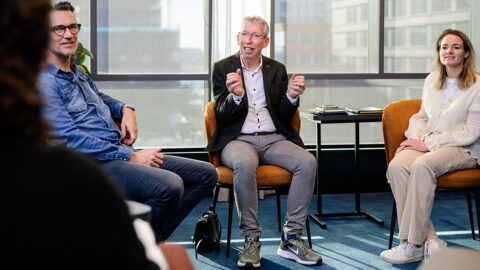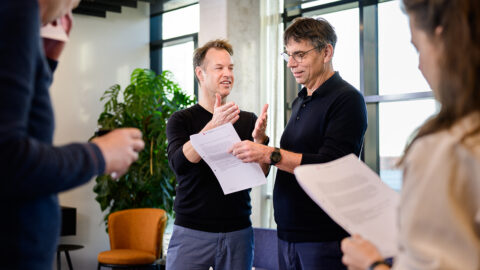House of Influence
Amsterdam

Do you work in an international setting or as part of a multicultural team? In this training, you’ll deepen your cultural awareness, learn to recognise and navigate cultural differences, and become more effective in your communication.

This training is designed for professionals working in international or intercultural environments. Whether you’re an expat, a highly skilled migrant, part of a multicultural team, or a Dutch professional collaborating across cultures, this training will help you communicate more effectively, build stronger relationships, and navigate cultural differences with confidence and clarity.
The focus is on cross-cultural collaboration in knowledge-based, professional settings.

In this training, you’ll develop a sharper awareness of how your own cultural background influences the way you communicate and how that may be perceived by others. You’ll gain insight into the cultural patterns that shape how people give feedback, build trust, make decisions, and express disagreement across different contexts.
Using frameworks like The Culture Map, you’ll learn to decode what’s happening beneath the surface of your conversations, especially when something feels “off” but is hard to pinpoint.
Rather than memorising country-specific rules, you’ll develop the skills to recognise and respond to differences in the moment with clarity, respect, and flexibility. You’ll practise real-life scenarios, receive personal feedback, and reflect on your own communication style.
The result? More conscious and effective cross-cultural communication, greater confidence in international settings, and a stronger ability to build trust and connection, even in moments of tension.

On the first day, you’ll explore the basic concepts of cross-cultural communication and reflect on your own values and cultural reference points, using a personal profile tool.
We’ll work with Erin Meyer’s Culture Map framework to understand key differences in how people from different cultures give feedback, build trust, express disagreement, and convey intent.
You’ll leave the day with a clearer understanding of your own communication style and how it may be perceived in different cultural contexts.
Now that you can see the patterns, how do you respond to them?
This day focuses on developing practical skills to communicate more effectively across cultural boundaries. We work with the Influence Model®, which offers a flexible set of influence behaviours to help you adapt your communication in intercultural situations without losing authenticity.
Through cases, reflection, and hands-on practice, you’ll learn how to be both clear and culturally attuned. We’ll also take a deeper dive into the three most relevant communication dimensions introduced earlier in the programme.
On the final day, we take things a step further: how do you stay connected when conversations become uncomfortable or complex?
You’ll learn how to give feedback, address tension, and bring up cultural discomfort in ways that build trust rather than break it. With the support of professional actors, you’ll practise having challenging conversations in a multicultural setting and receive direct, practical feedback on your communication style, clarity, and ability to build connection.
This final step brings all elements of the training together in a safe yet high-impact environment preparing you for real-world situations with greater confidence and skill.
Amsterdam

Oosterbeek

20 April
House of Influence
Amsterdam
| 20 April | 10:00 - 21:30 |
| 21 April | 09:00 - 21:30 |
| 22 April | 09:00 - 17:00 |
15 July
House of Influence
Amsterdam
| 15 July | 10:00 - 20:00 |
| 16 July | 09:00 - 20:00 |
| 17 July | 09:00 - 17:00 |
28 October
House of Influence
Amsterdam
| 28 October | 10:00 - 20:00 |
| 29 October | 09:00 - 20:00 |
| 30 October | 09:00 - 17:00 |
14 December
House of Influence
Amsterdam
| 14 December | 10:00 - 20:00 |
| 15 December | 09:00 - 20:00 |
| 16 December | 09:00 - 17:00 |